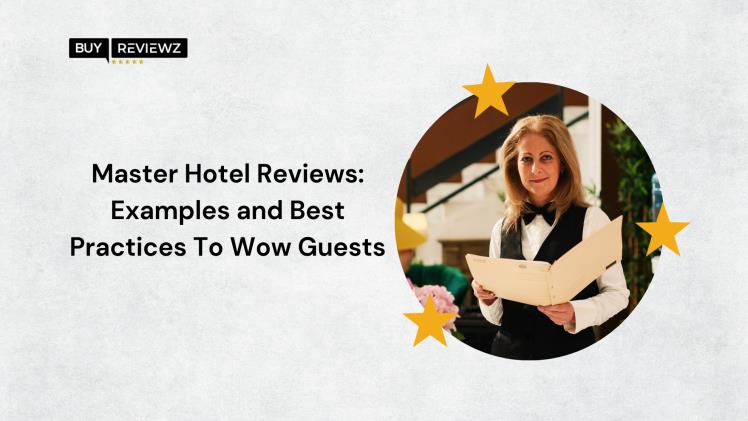Online reviews have become an integral part of the hospitality industry. Over 93% of travelers rely on review platforms like Google, TripAdvisor, and Facebook to check hotel ratings before booking a stay.
So, hoteliers must pay attention to guest feedback and actively manage their online reputation. However, many hotel owners must realize the importance of meaningfully responding to reviews.
This leads to lost opportunities to address issues, boost positive reviews, and buy Google reviews to attract more customers. In this post, we discuss the best practices for wowing guests with thoughtful review responses. Read on.
Best Practices To Wow Guests With Hotel Reviews
Providing exemplary customer service and experience has become crucial for the hotel industry’s success in today’s highly competitive market. Positive reviews boost online presence and attract new customers, while addressing issues shared in negative reviews helps maintain loyalty.
Here are some best practices for hotels to engage with reviews:
1. Personalize Your Replies
Guests appreciate personalized interactions, so taking the time to personalize review responses fosters goodwill. Addressing the reviewer by name and mentioning specific details from their stay shows the genuine care and attention each customer deserves.
For example, a response like “Thank you, [Reviewer’s Name], for your kind words about our hotel’s warm atmosphere and comfy beds. We’re glad you enjoyed exploring the in-room amenities during your extended stay with us.” helps reinforce a positive brand image.
Personal touches in replies make guests feel valued and encourage repeat visits and recommendations to friends and family. Even when addressing complaints, using personalized language like “I’m sorry to hear about the issues you faced with room cleanliness during your recent trip, [Reviewer’s Name].
Please accept my apologies.” comes across as more accountable than generic responses. AI tools can help draft basic replies, but human reviewers should always customize them with personal elements pulled from the original review to maximize impact.
For example, a reviewer posted:
“Lovely property but room amenities need an upgrade. The bed was comfortable but the TV and bathroom fixtures felt dated. Overall a nice stay though.”
2. Express Gratitude
It is important for hotels to show appreciation for all feedback, whether positive or constructive, to establish good rapport. A simple “Thank you for sharing your experience” goes a long way in making reviewers feel their input is valuable.
For positive reviews, expressing specific gratitude for things guests enjoyed helps strengthen their loyalty.
A reply like “We appreciate your feedback and are thrilled you enjoyed the restaurant’s seasonal menu and attentive staff during your weekend getaway!” acknowledges effort areas that met or exceeded expectations.
Similarly, responding to negative reviews with statements thanking the guest for bringing issues to light signals openness. “Thank you for your comments on check-in wait times. We value feedback that helps us continuously improve the guest experience.” reinforces the hotel’s commitment to satisfaction.
Consistently acknowledging reviews, without being defensive, helps change hostile feedback into opportunities for improvement.
3. Address Issues Directly
If handled properly, complaints offer a chance to resolve problems and gain loyal customers. So, the best approach is to address concerns head-on instead of ignoring or arguing. You must focus on providing fair explanations or potential solutions that demonstrate accountability and willingness to fix matters.
For example, if a guest mentioned long check-in wait times due to understaffing, stating, “We apologize for your extended wait during checkout.
Staffing has been an ongoing issue, and we are hiring more team members to minimize delays for all guests.” clarifies the issue is being worked on proactively rather than being brushed aside.
If room amenities like dated TVs were called out, committing to specific upgrade plans like “Based on customer feedback, we will be replacing all TV units in the next two months with smart, high-definition models” assures the reviewer changes are indeed happening.
Addressing issues transparently in this direct manner regains trust and prevents escalation better than vague non-committal responses.
4. Encourage Future Stays
While addressing real pitfalls, hotels must also find opportunities to positively influence future booking decisions through their review responses. Inviting reviewers to return shows confidence in being able to deliver an improved experience next time.
Feedback, even critical comments, helps enhance service standards over time. Constructive responses can therefore close with courteous revisit offers like “Thank you for your feedback – it will help us enhance our new room refurbishment project starting next month. We hope you give us another chance to host you once the upgrades are complete.”
This not only persuades current customers to become repeat patrons but also convinces potential guests reading the exchange to consider the property favorably in future.
Response tone remains important though – an insincere “please visit again” following an indifferent reply comes across as forced. Combining appreciation, accountability and revisit encouragement in the right measure leads to optimal customer retention.
4. Leverage AI Wisely
While AI-based review response tools automate drafting generic replies, human judgment is critical to customize them for maximum impact.
For instance, an AI may suggest this response to a complaint about noisy construction work: “We apologize for the disturbance. Please be assured we are addressing this issue.”
A manager could enhance it by adding: “Thank you for your understanding, Rajesh. As you experienced, renovations can be disruptive but necessary to upgrade guest amenities. Allow me to offer you a discount on your next stay once work is complete as a token of our appreciation.”
Personalizing responses based on review details like the guest’s name, staying preferences mentioned and promised follow-ups helps address concerns better. AI also requires human oversight to avoid inappropriate generated language that could exacerbate problems.
Overall, technology streamlines basic reply drafting but intelligent use of customer data demands human touchpoints to nurture long-term relationships.
Final Thoughts
To conclude, as consumers broadly share their experiences, customer feedback acts as a powerful driver of business growth or decline. While negative reviews pose temporary reputation risks, the bigger damage occurs from ignoring them as it breaks customer trust.
On the other hand, seeking, acknowledging and constructively addressing feedback helps increase loyalty and word of mouth. You can take the assistance of BuyReviewz to get more of it to further optimize search visibility. Good luck!






